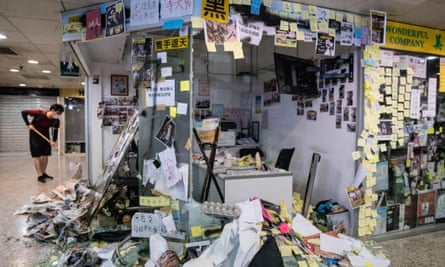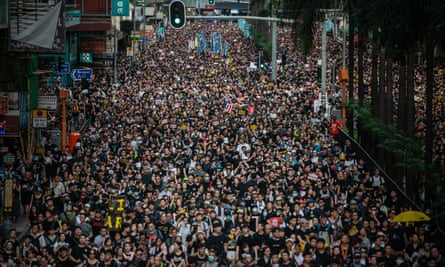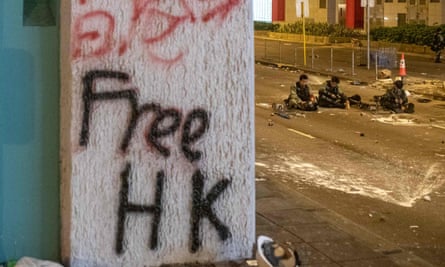Pro-democracy activists and lawmakers in Hong Kong have accused the police of standing by as men dressed in white attacked commuters and protesters, leaving 45 people hospitalised, including one who is critically injured.
Video footage showed dozens of men, mostly in masks, storming a mass transit station in Yuen Long late on Sunday, chasing passengers and beating them with sticks. Among those hurt in the attack were demonstrators returning from a large anti-government rally, as well as a pregnant woman and a woman holding a child, according to witnesses.
The footage, which emerged after an anti-government march by hundreds of thousands of people, caused widespread anger and condemnation as protesters and critics accused pro-Beijing officials of hiring thugs to intimidate protesters – a charge that Hong Kong leader Carrie Lam vehemently denied in a briefing Monday afternoon.
“Is Hong Kong now allowing triads to do what they want, beating up people on the street with weapons?” the Democratic party lawmaker Lam Cheuk-ting, who was among the injured, asked reporters.
A former legislator previously with a pro-Beijing party that usually supports Hong Kong’s leader, Carrie Lam, also criticised her over the attack. James Tien on Facebook called on Lam to resign, writing: “Chief executive Lam, are you still a chief executive? Or are triads ruling Hong Kong now?”
The pro-democracy lawmaker Ray Chan tweeted: “Hong Kong has one of the world’s highest cop to population ratio. Where were @hkpoliceforce?” Another lawmaker Gary Fan said: “Hong Kong is no longer a safe city”.
Flanked by Hong Kong’s police commissioner, security chief and government ministers on Monday, Lam attempted to deflect blame by condemning both sides. “Violence will only breed more violence and at the end of the day the whole of Hong Kong and the people will suffer,” she said.

Details of the attack shocked residents. A woman sobbed while recounting what happened during the Yuen Long attack, telling one witness in audio circulated online: “They beat people in the carriage indiscriminately whoever they were, even people who were returning home from work … Some men were shielding us. They didn’t fight back otherwise we would have been beaten even worse. They beat even women and children.”
Video filmed inside the train showed passengers screaming and crying as they attempted to shield themselves with umbrellas. The attackers used metal and wooden rods, as well as canes and brooms.
Footage showed a young man dressed in black being punched and kneed in the stomach by several men. A female journalist was beaten while filming the attack. Photos showed commuters bleeding and smears of blood on the station ground.
When police arrived at the station after 11pm, the assailants had left and angry protesters demanded to know why they had taken so long to get there. Police left and the attackers later came back a second time, breaking into a closed gate of the train station.
Hong Kong’s hospital authority said 45 people between the ages of 18 and 64 were injured in the attack, including one man who was in a critical condition and three in a serious condition. Late on Monday, police said they had arrested five people – some of them allegedly Triads – in relation to the attacks on charges of “unlawful assembly”.
Snippet of a live broadcast from lawmaker Lam Cheuk ting, showing self-professed pro-Gov't mobsters attacking passengers in train cars at #MTR #YuenLong Stn. #HongKong has 1 of the world's highest cop to population ratio. Where were @hkpoliceforce? Lam was injured as shown live. pic.twitter.com/Aq5JmJlf5u
— Ray Chan (@ray_slowbeat) July 21, 2019
On Monday, Yoho Mall, a shopping centre connected to the Yuen Long mass transit station, said some shops had closed amid rumours the armed men would return in the evening. Businesses outside the station in Yuen Long were also closed on Monday afternoon, leaving the normally colourful streets eerily quiet. Local public recreation centres were closed at 7pm due to “public safety considerations,” according to Hong Kong’s leisure and cultural services department. Many shops in the normally bustling shopping centres in the towns of Shatin and Tuen Mun have also closed.
Hiring men to beat up protesters is not a new tactic, according to activists and observers, who say thugs were also behind attacks on pro-democracy protests in 2014. Men, possibly from southern China, where the practice is more common, heckled and assaulted demonstrators.
A widely circulated video showed the pro-Beijing lawmaker Junius Ho, who lives in Yuen Long, shaking hands with men in white and giving them a thumbs up. In response to accusations that he had hired the men to go after protesters, Ho said in a press briefing on Monday that he had nothing to do with the attack. Asked why he did not call the police, Ho said: “They appeared to be normal residents, just like the protesters in your eyes.”
Protesters later covered Ho’s office in pro-democracy sticky notes and threw documents of his over an escalator. Several who covered their faces with scarves and hats later broke down a glass wall of his office in a shopping mall in Tsuen Wan. One poster on the wall stuck on by protesters said: “Rural bullies beat up people and carry out terrorist attacks!”

In the early hours of Monday, morning police entered a village near the station in Yuen Long where groups of men in white had gathered but said they had seen no weapons and made no arrests because they “could not be sure of who was involved”.
On Monday, Lam and her colleagues were pressed on why police took so long to reach the attacks, even after several people had called emergency services. The police chief, Stephen Lo, said officers, at the time facing down protesters who had amassed near Beijing’s liaison office, had to be redeployed.
Lam was criticised after lambasting protesters for their “blatant challenge to national sovereignty” before condemning the Yuen Long attack in statements issued late on Sunday after protesters clashed with police. Asked if she would characterise the attack in Yuen Long as a terrorist attack, Lam said only that she condemned all kinds of violence.

The protests, which began over a bill that would allow suspects in Hong Kong to be extradited to mainland China, have take on wider demands, including an investigation into police behaviour. The violence in Yuen Long and the police’s response is likely to be the focus of another protest.
On Sunday, thousands of protesters attending a peaceful anti-government march defied the police-sanctioned route and pushed westwards to Beijing’s representative office in Hong Kong, where they graffitied the building’s walls, threw eggs at it, and defaced the emblem of the People’s Republic of China.
Speaking outside the building on Monday, Wang Zhimin, the director of Beijing’s liaison office, said an “illegal mob” had “seriously hurt the feelings of the entire Chinese people”. Chinese state media called the attack a “blatant challenge to the central government”.
The demonstrations challenge Beijing’s authority over the former British colony, returned to Chinese control in 1997. Under the one country, two systems framework, Hong Kong is meant to maintain a high degree of autonomy from the mainland, with an independent judiciary and a free press. But critics say they have witnessed Hong Kong’s freedoms quickly disappearing.
Among protesters’ demands are democratic reforms that would give Hong Kongers the ability to directly elect their leaders. Protest groups have vowed to continue until their demands are met. “I don’t see this ending. It looks like it’s just going to escalate … it’s almost becoming ungovernable,” said Victoria Hui, a political scientist from Hong Kong, now at Notre Dame University.
